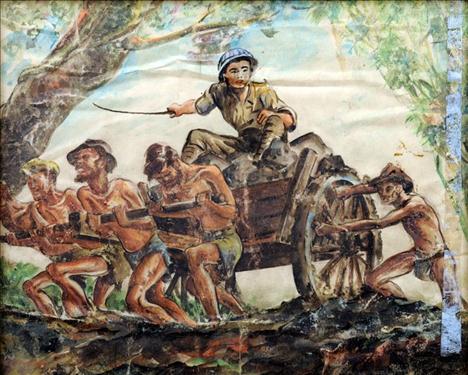A collection of graphic drawings by Birmingham comic book artist , Leo Rawlings, recording the horrors of the Japanese POW camps during World War II, and the construction of the ‘Death Railway’ across Burma and Thailand, will be sold at Rowley’s Auctioneers on 21 May.
These particular sketches, which were in private hands, have not been seen publicly before and show the cruelty of the Japanese soldiers and Korean guards, as well as the desperation of POWs who were abused, starved and left to die along the route of the railway. A collection of other drawings by Leo Rawlings is held by the Imperial War Museum.
Leo Rawlings, was born in Birmingham on 16 May 1918, despite a difficult time at school because of a speech defect, he won a scholarship to the Central School of Art in Birmingham. His parents later moved to Blackpool where he joined the Territorial Army at the start of the war. When he returned to England in 1945 he was employed as an illustrator on a number of ‘boys own’ comics, including ‘The Victor’, ‘The Hornet’, and ‘Marvelman’. He often recaptured his prison camp experiences (though in less grizzly detail) in two of his best known strips ‘The Island of No Return’ and ‘The Army of Shadows’.
Will Axon, Rowley’s senior value and auctioneer said: ‘Rawlings was taken prisoner by the Japanese at the fall of Signapore in 1942 and he eventually ended up working, along with many others thousands of POWS , on the construction of the notorious ‘Death Railway’. He sketched throughout his 3 ½ years of captivity and risked his own life to record the cruelty and mistreatment of prisoners, hiding the drawings in a stove-pipe buried under his bed. An army officer encouraged him to capture the treatment of POWs as a permanent record and many of the drawings were produced while he was in hospital using any materials he could find, including crushed standstone and vegetable die. If the sketches had ever been found he would have been executed immediately.’
The four drawings, which Rowley’s auctioneers will sell, include a picture called ‘Trail of Death’ showing the jungle with the decomposing bodies of fallen workers. Another depicts emaciated and sick POWS pulling a Japanese guard in a cart through heavy mud. The drawings have handwritten captions by Rawlings – one commenting on the cruelty of the Korean guards which many found worse than the Japanese.
The construction of the ‘Death Railway’ followed a heavy Japanese defeat at the battle of Midway in 1942 – commanding officers realised it was necessary to improve the supply route to Japanese troops in Burma. The construction of the Burma – Thailand railway link across mountainous jungle territory had been unthinkable pre-war but the supply of free labour via captured allied forces in the Japanese POW camps, and cheap civilian labourers from Vietnam, Malaya, Burma and Thailand, made it feasible. The Japanese were determined to build the link whatever the human cost and approximately 13,000 POWs and 70,000 Asian civilian workers lost their lives during the construction of the link.
When cholera broke out in 1943 following monsoon rain, conditions in the camps became unimaginable. There was little food for prisoners because supplies couldn’t get through and starving POWs were tortured and forced to continue working no matter what their physical condition was. The Japanese refused to isolate camps so disease spread and thousands died, many contracting cholera while others were literally worked to death. The railway link finally joined the existing Moulmein-Ye line in 1943 and was used by the Japanese until November 1944 when allied air raids famously destroyed the bridge over the River Kwai as well as other sections of the line.
Leo Rawlings later wrote a book about his experiences and lectured widely but he was always haunted by his memories of the camps.
Rowley’s Auctioneers will sell the drawings on 21 May in Newmarket and expect them to make in excess of £500.
To view more images click on the link here
For Sale Information contact Will Axon on 01353 653020 or email [email protected] at Rowley’s Fine Art Auctioneers



